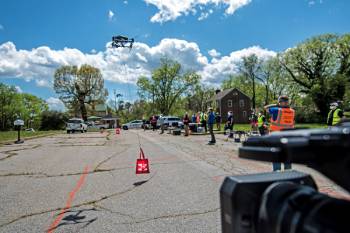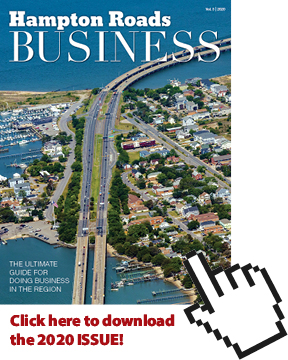By land, sea and air
Drones take center stage during pandemic
Sydney Lake //September 28, 2020//
Faced with challenges associated with the COVID-19 pandemic, many Hampton Roads businesses and universities are looking to drones for help. Unmanned flight systems also are likely to drive economic development in the future.
In May, when the fear of dwindling personal protective equipment was still fresh, the Herndon-based Center for Innovative Technology (CIT) partnered with Virginia Beach-based DroneUp to test how drones could assist medical professionals in delivering test samples and PPE with no contact between humans.
With 103 test launches at the former Saint Paul’s College site in Lawrenceville, DroneUp was able to successfully deliver 100 packages to partner organizations at stations set up around the 55-acre campus.
The company then started working in the spring on a white paper to be sent to the White House with recommendations for best practices and a blueprint for how other organizations and agencies can deploy drones. And although DroneUp couldn’t share specifics of where the project may be headed, company spokesperson Amy Wiegand says that this is an area the company will continue to work on.
DroneUp also has continued to expand its flight services through its April acquisition of Glenview, Illinois-based AeroVista Innovations LLC, which provides drone training for private and public sectors now as the DroneUp Training Academy. The company also added Low Altitude Authorization and Notification Capability to its app, which allows drone pilots to get airspace authorization with the Federal Aviation Administration, Wiegand says.

“That continues to develop because technology grows and changes and evolves,” she says.
While DroneUp flexes its new capabilities, Old Dominion University’s Virginia Institute for Spaceflight & Autonomy (VISA) is hard at work to develop the Autonomy Research Institute for Societal Enhancement, or ARISE.
VISA, along with Hampton University and William & Mary, as well as REaKTOR, the National Institute of Aerospace and Longbow Group, plans to develop a center at Fort Monroe to look at integration of autonomous systems into public use across air, sea and land.
The group’s goals are economic development, workforce development and research, says VISA Executive Director Dave Bowles, and the organization has applied for funding through GO Virginia, the state-funded initiative to foster regional private-sector growth. Bowles says he expects to hear about the funding decision in late September.
“Hampton Roads is well-positioned to be a big player in [autonomous systems],” Bowles says. “We’ve got the port, the naval footprint and … I think autonomous systems can play a tremendous role in offshore wind for maintenance, inspection and supply. This center is a good complement to other assets the commonwealth has, and I think it could be a big [source] for bringing in new businesses into the area.”
Training professionals to use unmanned systems and bringing drone capabilities to the public will be key in the next phase of growth in the industry, he says.
The Virginia Open Data Cube, a collab-orative project involving NASA, VISA and ODU’s Virginia Modeling, Analysis & Simulation Center (VMASC), combines data from satellites, drones and other sources and makes it available in an open-source format. It is already in use at higher education institutions and businesses in Hampton Roads to prepare for flooding associated with sea-level rise.
Having the information in one place will inform businesses and higher education institutions on how to better safeguard coastal resiliency, Bowles says.
Karen Jackson, chairman of the Unmanned Systems Association of Virginia, says that the industry is set to grow as a result of the pandemic, which has broadened the possibilities for deliveries.
“We’ve seen an acceptance level that is headed in the right direction, and it’s headed in a way that will only grow,” says Jackson, who served as state secretary of technology under Gov. Terry McAuliffe and is the New College Institute’s interim executive director.
Unmanned systems can speed up delivery times for companies and organizations, she says. “Part of that is it does take away proximity. Geography becomes much more simple when you can fly [instead of] drive. … As people get more comfortable with [drones], and people learn how to use them responsibly … the use cases are becoming more and more compelling.”
e


















